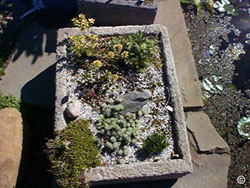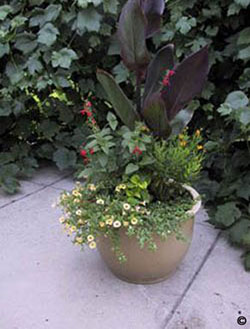Containerized trees, shrubs, and perennials are subject to extreme cold, drying winds, and frequent freeze-thaw cycles in Colorado winters. Extra protection and care must be provided to ensure root and crown survival.
When do I winterize container plants?
 In November, or when soils have cooled, homeowners with large pots should choose a protected area in the garden.
In November, or when soils have cooled, homeowners with large pots should choose a protected area in the garden.
How do I winterize container plants?
Sink the plants’ pot and all into the soil. Make sure the pots are well watered and then mulch six to twelve inches deep with straw, leaves, hay, or shredded bark. The roots will be protected by the moderating effects of surrounding soil. Check the pots monthly throughout the winter and water if needed to prevent desiccation.

What if I don’t have room in my garden?
If sinking the pots in soil is not possible, cluster containers together in a protected site under the house eaves on the north or east side. Place larger pots to the outside and smaller pots to the inside of the cluster. Water pots well, then mulch heavily with straw, leaves, hay or shredded bark. Provide a thick layer of mulch or bales of hay around the outer edge of the cluster. Also, mulch over the top of the pots to lessen the impact of root-killing temperature fluctuations. Check every two weeks and water as necessary.
What do I do next spring?
Remember next spring to remove all mulching and packing when plants begin to show signs of growth. Remove mulch on a gradual basis as weather warms in late winter to early spring.
Can I put my potted plants inside?
Absolutely, another overwintering option is to move containerized plants into an unheated garage or shed. Check soil moisture frequently and water as necessary.
For more information, see the following Colorado State University Extension fact sheet(s).
For more information, see the following Planttalk Colorado™ script(s).


